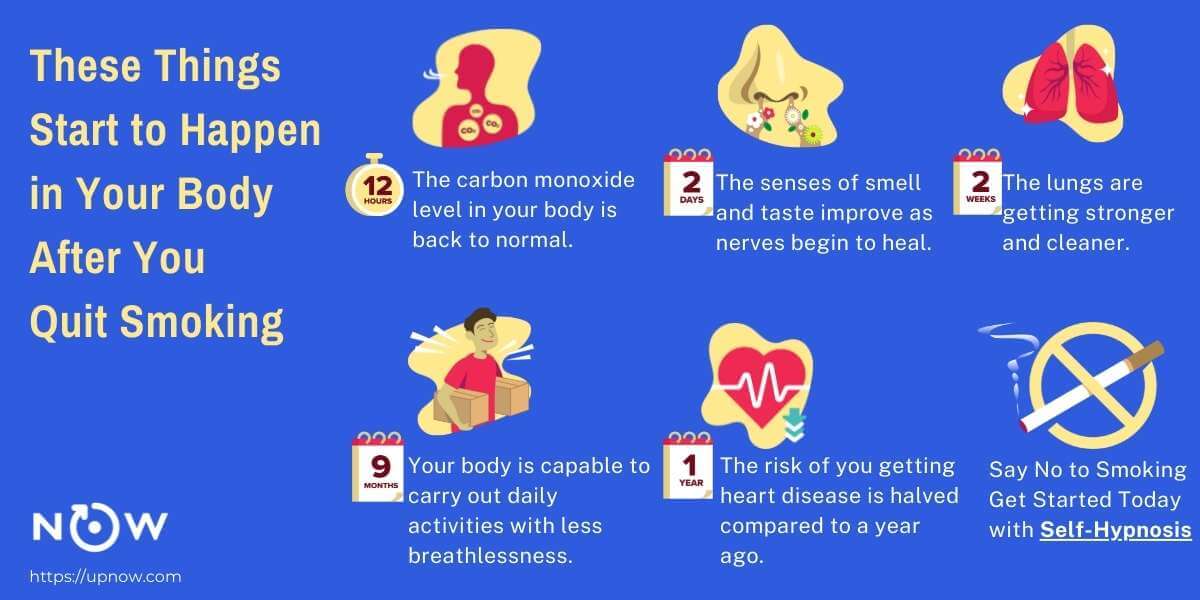
Gut-Directed Self Hypnotherapy for IBS: Enhancing Mind-Gut Health Explained

Seven Foods To Avoid With IBS
Table of contents
Quitting smoking can be hard. Every year only 6% of smokers are able to stop smoking cigarettes even though about 50% are trying to ditch this bad habit permanently. The natural consequence of such a low quit smoking success rate is a stubbornly high percentage of smokers. It is not unusual to hear that some smokers had to make multiple attempts before successfully stopping smoking. They have enough motivation, but their brains’ biochemistry had been altered to such an extent that they feel a compulsion to smoke.
Many reasons account for why people might want to stop smoking. For some people a medical diagnosis leads to the realization that they need to conserve their health. The desire to quit smoking becomes a necessity. For others, seeing close friends or relatives suffer the dire consequences of long-term smoking may open their eyes.
Whether you have already decided to let go of that bad habit or are still using excuses, hypnosis to quit smoking is a highly effective tool worthy of consideration. Quitting any addiction requires motivation, focus and determination. Without these factors in place, all attempts may be unyielding.
We trust that you have the motivation. Hypnosis aims to bring the mind to focus. Self-hypnosis to quit smoking, therefore, equips the smoker with tools that instill calm, guidance, and dedication to their mission.
Why Is It So Hard to Quit Smoking?
Cigarettes are engineered to deliver nicotine
Cigarettes contain an addictive substance called nicotine. It is one of more than 4,000 chemicals, hundreds of which serve the purpose of reinforcing the absorption of nicotine or enhancing its taste. A smoker inhales about 1 to 2 mg of nicotine when smoking one cigarette. That nicotine travels through the bloodstream and then reaches the brain.
A rush of adrenaline provides a “kick”, a short-term surge in energy, focus and concentration. The nicotine also activates the reward pathways and the release of dopamine, creating then a sense of pleasure. Continued consumption of nicotine alters the brain’s circuitry and can lead to withdrawal symptoms. The addiction sets in over time and the smoker feels the urge to go back to the cigarettes, making it more difficult to follow through the resolution to quit smoking. It might take only a few hours for withdrawal symptoms to start, which leads the smoker to start smoking again.
Many who tried to stop smoking switched from smoking cigarettes to vaping or chewing tobacco. But both methods continue to deliver nicotine, the addictive element in tobacco, and can as a result lead to continued cognitive impairments or addiction.
Understand the mechanisms behind this dependence is the very first step to understanding how to quit smoking effectively. In a nutshell, your brain gets used to the nicotine delivered through smoking.
Your brain changes: short-term pleasure outweighs long-term costs
Roy Baumeister, an American social psychologist, studied the topic of free will in smokers. In his 2017 study, he concluded that smokers could remain in control of their behaviour but didn’t seem to be able to control the desire for smoking. Most noticeably, he highlighted that the short-term pleasure of smoking seemed to outweigh the long-term cost of physical disease, dementia, and increased mortality. The imbalance in favor of short-term pleasure is due to changes in your brain and the activation of reward pathways by smoking.
Cravings are cue-induced
People tend to smoke because of things that make them think about smoking. Over time people create associations between places, people, or times of the day and smoking. For instance, seeing people you smoked with might make you want to smoke. Or going to selected places can make you think about smoking.
A thought is not alone in guiding you to smoke. A feeling can also trigger the urge to smoke. People might distract themselves from an emotion or feeling they dislike by lighting up a cigarette. These feelings are wide in nature, from stress to sadness. These triggers are mostly subconscious and govern our actions. That is why hypnosis to quit smoking can shine because it works at the level responsible for the cravings.
The Benefits of Quitting Smoking
One only need experience a single day at optimum health to know why it is so important to maintain it. Any veteran smoker knows the side-effects of smoking. They include:
- nausea
- bouts of breathlessness
- fluctuating blood-pressure
- liver dysfunction
- bronchitis
- candida
- poor circulation
- heart palpitations
According the Centers for Disease Control and Protection, some of the benefits include but are not limited to a reduction in the following problems:
- Development of obstructive chronic pulmonary disease and peripheral arterial disease.
- Strokes and aneurysm (like abdominal aortic aneurysm)
- Subclinical atherosclerosis
- Inflammation and hypercoagulability markers
- Lung-related diseases
- Development of over twelve cancer types (from colon to the larynx).
- Digestion and gastrointestinal issues
- Dementia
- Risk of premature death (by approximately ten years)
- Interference with much-needed medications
Smoking may increase the probability of adverse effects for common medications such as oral contraceptives, antipsychotics, antidepressants like benzodiazepines, as well as inhaled corticosteroids to control asthma and beta blockers used for blood pressure control.
At the same time, the benefits extend to considerable improvements in:
- Cognition
- A better sense of vitality, well-being, and control over one’s time.
- A deep sense of achievement in fighting the addiction
- The overall wellbeing of family members, pets, and social acquaintances
The Veteran Smoker’s Negotiation List
When it comes to smoking, there is little rationality left. Smoking is the leading cause of preventable death and yet too many smokers come up with reasons as to why they will not quit smoking. These rationalizations often become negotiation points:
- I can breathe fine while walking
- I have too many responsibilities to face withdrawal symptoms now
- I can stop whenever I want to – maybe next year
- I will stop by age such-and-such
- I live alone and am not hurting anyone
- Tobacco relieves my anxiety – I choose tobacco over antidepressants
- Everyone I know smokes
- My diet is healthy
- All of my family members smoke and they are fine
- I live with a smoker so it would be too difficult to stop
- I don’t use drugs or drink alcohol, so smoking is my only nemesis
Each of these assertions can be refuted. Some are just delaying the decision on the grounds that the smoker can defeat the addiction. But the statistics paint a different picture: they show that smoking remains one of the largest causes of death, either directly or indirectly. For example, according to the World Health Organization, over eight-million people died due to tobacco-related issues annually.
For example, the World Health Organization reported that over eight-million people died due to tobacco-related issues annually.
What Happens to Your Body when You Quit Smoking?

The simple act of attempting to quit smoking, or even searching for tips to quit smoking, is a great step in the right direction. Returning the body to pre-smoking health levels is no walk in the park but is entirely achievable.
Picture yourself in the near future. You have successfully embarked on a smoke-free journey. Your body is ridding itself of toxins and it is going through a positive transformation. Here are some of the most noticeable marks on the timeline that follows the moment when you quit smoking.
- In just a few minutes your heart rate drops down.
- In about one day, the concentration of nicotine in the bloodstream drops to almost zero.
- In a few days, the level of carbon monoxide decreases to levels seen in non-smokers.
- In 1 or 2 years, the risk of heart attack drops considerably.
The quitting smoking timeline does not stop here. It extends well over to 20 years as the body restores optimal functioning.
Hypnosis for quitting smoking can help you make the first step on that transformative journey. It can facilitate the dreaded transition from dependence to freedom.
How Long Does it Take to Quit Smoking?
The second most asked question after “how to quit smoking” is often “how long to quit smoking”. How long it takes to quit smoking will depend on how dedicated you are to ending the habit of smoking completely, your environment, and the method you choose.
When smokers focus on overcoming these cravings one at a time, those that follow the first few incidences become less severe.
Here is what you should do to reduce the time needed to stop smoking.
- Stay busy: the more active you are physically or mentally, the less time you need to eliminate this bad habit.
- Remind yourself of the why behind your decision to stop smoking and reward yourself. Every win counts.
- Manage your emotional state and reduce stress as much as possible. You can go for a walk, take deep breaths, or engage in calming self-hypnosis.
- Reduce cues in your environment: for example, remind people around you that you have stopped smoking so that they don’t offer you a cigarette. Connect as much as possible with people who are supportive of your goals. Changing your environment is essential to reducing the risk of relapse. It should be your first priority.
- Deal with the cravings as they come, one by one.
The National Cancer Institute states that withdrawal symptoms peak over the first three days after quitting, and can continue for up to one week. After which the symptoms tend to be less severe, although still present, and become somewhat easier to manage. By staying the course during the 1st week, you increase your chances of success. That does not mean that cravings do not persist over months. Remember that these cravings tend to be short-lived. Many smokers report that withdrawal symptoms last for up to fifteen minutes.
Self-hypnosis does not only help you quit smoking. It helps you manage the negative side-effects that can come with smoking such as poor sleep, excessive appetite, and moodiness. Because it helps you partner with your mind, self-hypnotherapy can help you reduce the frictions that came with traditional smoking cessation treatments.

Methods and Tips to Quit Smoking
There are numerous ways to stop smoking, with various levels of effectiveness. They include self-hypnosis, acupuncture, substitutes like patches and gummies, meditation, cognitive behavioural therapy (CBT), quitting cold turkey and weening. It is important for you to choose the most effective method that fits with your lifestyle and future goals.
How Effective are Vapes as a Method to Quit Smoking?
Many smokers state that turning to vapes as a substitute for cigarettes worked for them. Unfortunately, there is little evidence to support the use of vaping to a substitute to smoking. The FDA has not approved any e-cigarette as a valid smoking cessation treatment.
The Centers for Disease Control and Prevention states that 99% of vapes contain nicotine. While the lungs are not affected directly by smoke from burning tobacco, the nicotine is still present and can maintain the vicious cycle of addiction.
Beyond that, vaping can lead to lung infections and vaping-related pneumonia. E-vaping can coat the lungs with potentially harmful chemicals.
Nicotine Replacement Therapy
Nicotine Replacement Therapies can be helpful depending on the smoker’s lifestyle. Some of these include:
- Skin patches
- Nicotine gum or quit smoking gummies
- Tablets, oral strips or lozenges
- Nasal or mouth sprays
All of these methods have their pros and cons. In some cases, the individual can use a combination of two or more alternatives. While patches, gum and gummies, lozenges, and spays do contain nicotine which is released gradually, prescription medications aim to interfere with nicotine receptors in the brain. They can be effective but have notable side-effects that have often been referred to as unpleasant. Remember to always consult your healthcare provider when it comes to taking prescription drugs.
How to Quit Smoking Cold Turkey
Going cold turkey means to quit outright without any therapies or substitutes. The chances of quitting cold turkey are slim. About 95% of those who tried to quit with sheer willpower failed over a 6 to 12 months period. The withdrawal symptoms due to the addictive nature of nicotine include:
- Irritability
- Depression and anxiety
- Difficulty sleeping
- Impaired concentration
- Increased appetite
- Throat and oral discomfort
- Digestion issues
- Nausea, headaches and shaking
In those unable to withstand the physical symptoms of withdrawal, the emotional changes can be felt at home or in the workplace. It is highly recommended to let friend, family and co-workers know that you are quitting smoking cold turkey. Building the necessary support around you is one of the most important ingredients in your success.
Acupuncture
Acupuncture is a form of alternative healing which has proven successful in many fields of medicine and therapy. As an ancient Chinese remedy for various physical and mental issues, it makes use of needles which are inserted at different pressure points in the body, also known as meridians or energy lines in the body.
An interesting study on acupuncture as a method to stop smoking suggests that it can change the taste of tobacco, and reduce the desire to smoke. However, the studies showed that these factors alone were not enough to quit smoking entirely.
How to Quit Smoking Easily with Self Hypnosis.
Finding substitutes to an addictive substance can only be a temporary solution. The ability to work at the level of the desires that lead to smoking is a much promising solution. That is exactly what hypnosis does. By overcoming negative thought patterns, it helps a person choose healthier behaviours while maintaining good quality sleep and regulate appetite. In other words, the common side effects of traditional therapies are greatly reduced if not eliminated. Through self-hypnosis, the “Veteran Smoker’s negotiation list” becomes null and void as the person becomes more concerned with their health and vitality. The person who experiences hypnotherapy can start enjoying a greater sense of relief and freedom as the benefits of quitting smoking become more tangible.
Hypnotherapy aims to address the underlying impulses that drive cravings in order to weaken the desire to smoke. In a study by Gary R. Elkins and M. Hasan Rajab, 81% of those who completed the hypnosis treatment (in total twenty-one individuals) stopped smoking. A year later, 48% were still abstaining from smoking.
How to address Withdrawal Symptoms
The range of withdrawal symptoms are varied and can be addressed through a mix of physical and mental exercise as well as proper diet and supplements.
Some of the quit smoking side effects include, but are not limited to:
- Headaches and nausea
- Coughing and sore throat
- Increased appetite
- Tingling hands and feet
- Nicotine cravings
- Irritability and anger
- Constipation
- Insomnia
- Impaired concentration
Many tools are available to help you manage these side effects from diet and mineral supplements to exercise and mindfulness activity. A tool that stands out is hypnosis. Through the use of suggestions and access to the state of focused awareness that characterizes hypnosis, a person can manage negative emotions, increase concentration and sleep better.
How Will You Feel When you Quit Smoking
If you can remember how you felt before you started smoking; the pace you moved at, the amount of energy you enjoyed and the general state of ease you experienced, you can easily imagine how you will feel once you have stopped smoking.
No more shortness of breath, no more bad breath; you’ll be saving money for better things; you’ll be able to mingle at social events without having to sneak away; your life expectancy will increase, as will your creativity and desire to want to be active, alive and full of zest. By quitting smoking you’ll reduce medical bills and save on trips to the chemist for ailments stemming from smoke inhalation.
But most of all, you will have achieved self-control and determination through tenacity. You will have won one of the most difficult battles faced by humans in this century. You will have overcome addiction, and for that you will be rewarded ten-fold!
What is the Best Way to Quit Smoking for Good?
No one knows you better than you know yourself. You are aware of your strengths and weaknesses; what you are capable of achieving and what you can fail at. Should you choose to try medication, it is advised that you discuss the best way forward with your healthcare professional. But remember that with the recent progress in understanding the mind-body connection, there is a large chance that your doctor might advise you to use self-hypnosis.
Hypnotherapy is non-invasive and requires no pills, needles nor prescriptions. All it requires from you is your agreement and understanding of how the human mind and body work together as one. In the UpNow self-hypnosis audios, your hypnotherapist will guide you through the process, and help you find embark on the smoke-free and healthy journey you deserve.
There is increasing support for using a quit smoking hypnosis app. For more information, check out UpNow.com.
UpNow Health only uses high-quality sources, including peer-reviewed articles, to support the facts within our articles. All our articles are reviewed by experts to ensure that our content is accurate, helpful, and trustworthy.
1. Baumeister R. F. (2017). Addiction, cigarette smoking, and voluntary control of action: Do cigarette smokers lose their free will?. Addictive behaviors reports, 5, 67–84. https://doi.org/10.1016/j.abrep.2017.01.003 Accessed 8 August 2022.
2. Lucas C, Martin J. Smoking and drug interactions. Aust Prescr 2013;36:102-4. https://doi.org/10.18773/austprescr.2013.037 Accessed 8 August 2022.
3. Ferguson, S. G., & Shiffman, S. (2009). The relevance and treatment of cue-induced cravings in tobacco dependence. Journal of substance abuse treatment, 36(3), 235–243. https://doi.org/10.1016/j.jsat.2008.06.005. Accessed 9 August 2022.
4. Kang, H. C., Shin, K. K., Kim, K. K., & Youn, B. B. (2005). The effects of the acupuncture treatment for smoking cessation in high school student smokers. Yonsei medical journal, 46(2), 206–212. https://doi.org/10.3349/ymj.2005.46.2.206 Accessed 9 August 2022.
5. He, D., Medbø, J. I., & Høstmark, A. T. (2001). Effect of acupuncture on smoking cessation or reduction: an 8-month and 5-year follow-up study. Preventive medicine, 33(5), 364–372. https://doi.org/10.1006/pmed.2001.0901. Accessed 9 August 2022.
6. Elkins, G. R., & Rajab, M. H. (2004). Clinical hypnosis for smoking cessation: preliminary results of a three-session intervention. The International journal of clinical and experimental hypnosis, 52(1), 73–81. https://doi.org/10.1076/iceh.52.1.73.23921. Accessed 9 August 2022.














